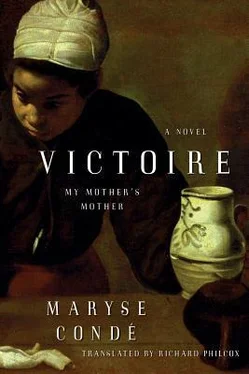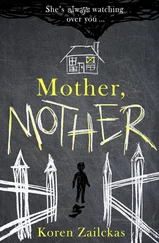The spoiled ways of an only child were tempered by an extreme grace. Thérèse spoke French with a lisp, which had a certain charm to it. Her Spanish was faultless. Like her Creole. Imitating her father, she wasn’t ashamed to speak it or at times make it rhyme. In short, once again it was a shame no suitor came to claim this treasure.
Thérèse had stepped off the sailboat in Grand Bourg shortly after Christmas Day with three trunks of Spanish leather stuffed as usual with presents: an embroidered shawl for her mother, a Panama hat for her father, and a pair of lovely red pumps for Victoire. Victoire had never worn shoes in her life. Up till then, she had walked barefoot along the stony paths. Her soles were rough and cracked. Her nails gray and sharp like clam filings. Her toes pointing like the eyes of a crab. Nevertheless, she managed to slip on her red pumps. Maché kochi. Maché kan memn . Thérèse, who was enamored of harmony, was saddened by Victoire’s wardrobe, two smocks made of jute. She had tailored for her two maid’s aprons, made of black serge and edged in white, three loose-fitting golle dresses, as well as a Creole matador costume in dark green and mauve satin with an apple-colored headtie for high mass. Nobody could understand why Thérèse showered these acts of kindness on Victoire, who became no more affable with time. What a contrast! One slender and dressed in the latest fashion with a moleskin hat. The other looking no more than thirteen at the age of sixteen; a sloppily tied madras headscarf cut low across her forehead level with her pale eyes. She never smiled and walked woodenly, like a carnival bwa bwa .
Apart from these sartorial modifications, Thérèse’s arrival changed little with regard to Victoire’s condition at the Jovials. Each of them kept to the place assigned by destiny. There was no familiarity between godmother and godchild. Under her frigid appearance, Victoire must have been devoted to Thérèse as if she were the Blessed Sacrament herself. And Thérèse let herself be worshipped with a smug indifference. I have no knowledge of any conversation or exchange of words between them on any subject whatsoever.
As for me, there is one thing I find hurtful. Thérèse, who boasted she was a militant feminist and who had read Mary Wollstonecraft in the Spanish translation, never thought of teaching her protégée to read and write. If she had, she would have removed her from the obscurantism in which Victoire lived all her life. She would have opened the doors to another future for her. We can even imagine that her entire existence would have changed. It was not for want of opportunities, however. At the time, the Brothers of Ploërmel dispensed free evening classes for adults. In short, relations between the two girls were extremely limited. Victoire was responsible for bringing up the breakfast tray at nine o’clock on the dot, since Thérèse was graced with the adolescent faculty of sleeping late. If she had been left to her own devices, she would have slept until noon, something that is unchristian. Victoire would bring the sweet, fragrant coffee from Cuba that Thérèse was fond of. Papayas, guavas, and Bourbon oranges cooling on crushed ice. She would come up to the bed and whisper timidly:
“Ninnainne, lévé. ”
Thérèse would stretch catlike in her light brown colonial medallion bed made of locust wood, sit up amid the tangle of fine linen sheets, smile, and dismiss Victoire with the wave of her hand. And that’s as far as it went.
Unlike La Pointe or Saint-Pierre in Martinique, Grand Bourg could boast of neither a theater nor a concert hall. Every Tuesday, Fulgence, Gaëtane, and their friends, who made up the embryo of a local bourgeoisie, gathered in the living room to listen to Thérèse. For them she would play just a few simple pieces: a little Chopin, sometimes some Liszt, not too virtuoso, or else The Carnival of Venice and The Siege of Saragossa . Victoire, instead of serving the guests the bowls of coconut sorbet and homemade cookies, braved the furious looks of Danila and had the nerve to go and sit behind a potted palm and listen in ecstasy to the flow of music.
The high point of these private concerts was when Thérèse played the Cantos Flamencos, anonymous gypsy ballads she had adapted for the piano.

On January 1, 1889, when thirty-four loyal Légitimus followers sat down to lunch, Fulgence introduced his protégé, the new elementary school teacher at Les Basses. Dernier Argilius, the youngest and last son of a poor farm laborer’s family from Saint-Louis, bore his name, since his parents wanted the Good Lord to know that finally they had had enough. After fourteen children, and four who had died, they no longer wanted His heavenly gifts. Dernier was one of the first holders of the colonial diploma and a member of the Republican Youth Committee. It was rumored he was a former Légitimus party militant, a zambo. After the elections he had apparently been seen patrolling the streets and brandishing a stick, threatening people with light skins. There is a photo of him in a book by Jean-Pierre Sainton, a Guadeloupean historian. The requisite very black skin, a head of thick, frizzy hair curling over a domed forehead, a determined look, a broad nose, clearly drawn lips, and dressed in a tight-fitting frock coat. His expression is arrogant and mocking. On bel nèg! as the saying goes. Women devoured him with their eyes, lingering surreptitiously over the treasure that fitted tightly in his impeccable woolen trousers.
He wrote editorials in Légitimus’s broadsheets. I discovered one: “We are hungry, we are thirsty, we are barefoot, we have no work; we have no home, we survive thanks to the grace of God. Our families are impoverished. Our women have lost their beauty, bruised under the heel of destitution.”
My reason for reproducing this piece of grandiloquent prose at the risk of boring my reader is because I would like to ask a question that I deem important. Dernier Argilius has gone down in history like Jean-Hégésippe Légitimus as an ardent defender of the illiterate oppressed Negroes emerging from the belly of slavery. When he died tragically in 1899, the entire island went into mourning. Ever since then, theses, monographs, and biographies have been written on the subject of this role model and martyr. My question, then, is what is an exemplary man? Is it only his writings, his public speeches, and his gesticulations that count? What weight does his personal life and private behavior carry? Dernier Argilius took advantage of I don’t know how many women, wrecked the life of at least one of them, and engendered I don’t know how many bastards who grew up without a father. Doesn’t that count?
From the very minute Thérèse’s and Dernier’s eyes met, sparks flew that set their bodies on fire. During lunch he drew up a chair to her left and whispered pell-mell all the clichés of a miserable childhood, a humiliated adolescence, and a passion for the Race from a very early age. During dessert, she sat at the piano and accompanied him as he thundered out with his bass voice the old political favorites; all the guests joined in with a frenzy exacerbated by the alcohol ingurgitated:
Nou voyé on blanc alé
I pa fè annyen ban nou
Voyé on pwèmyé milat
I pa fè annyen ban nou
Voyé on dézyèm milat
An nou voyé Léjé alé pou I défann no z’entéré
An nou voyé Léjé alé pou I monté o Pawlèman!
In the meantime, their blood was boiling with excitement. They were soaked with the burning sweat of desire. If they had been free to do so, they would have rushed into Thérèse’s bedroom and, flouting bourgeois preliminaries, gone into action. Instead, they had to wait one long week, the time it took to elude Danila’s vigilance and especially that of Gaëtane, who would be constantly warning her daughter:
Читать дальше













